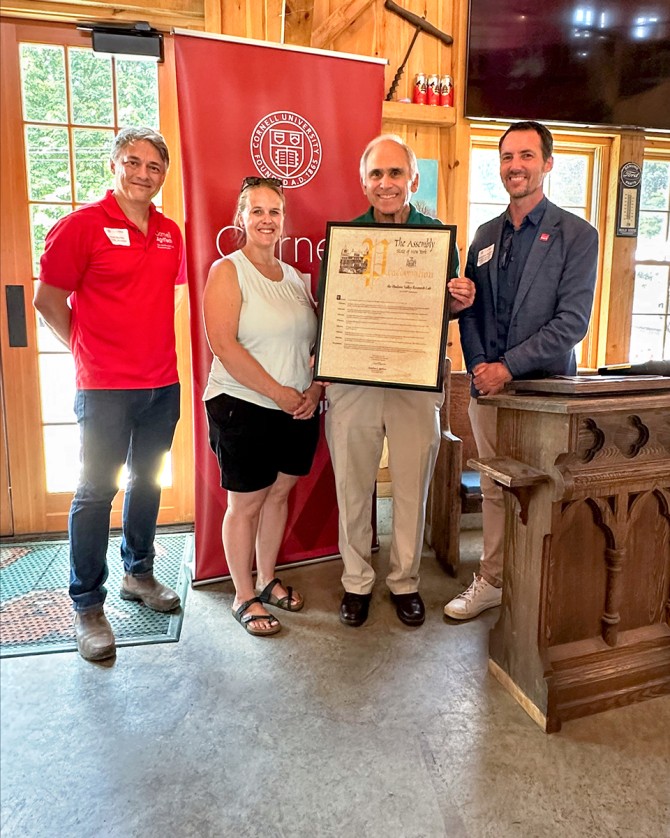Hudson Valley Research Lab celebrates its 100th
By Mike Hibbard
Local farmers and growers, Cornell officials and others observed the 100th anniversary of the Hudson Valley Research Laboratory (HVRL), part of Cornell AgriTech, in a celebratory event Aug. 18 in Highland, New York.
Jared Buono, the lab’s director, looked back over the last century and toward the future, and was quick to acknowledge the farmers and growers, whose constant support has played a pivotal role in making the lab one of Cornell AgriTech’s biggest success stories.
“Honestly, we would not be here without them,” Buono said. “The farmers feel strongly about the work we are doing here. It’s truly an amazing partnership.”
It’s a partnership that began in 1923, when New York Governor Alfred E. Smith signed legislation enabling the New York State Agricultural Experiment Station in Geneva (now Cornell AgriTech) to establish a field station for agricultural research in the Hudson Valley for the “experimental study of the problems of increasing the production and controlling the diseases and injurious insects of the horticultural crops of the Hudson River Valley.”
Cornell scientists began their work in Highland, Ulster County, then on the campus of Vassar College in Poughkeepsie, Dutchess County. The lab later moved to two locations in Poughkeepsie.
In 1942, the local fruit industry organized the Horticultural Research Cooperative — later named Hudson Valley Research Laboratory, Inc. — to provide assistance and leadership in finding appropriate facilities.
When fire gutted the Poughkeepsie lab in 1962, local growers and farmers bought land in Highland and built an $80,000 physical plant. Cornell agreed to lease, equip and staff the new buildings.
“Farmers have stepped up every time,” Buono said. “When the lab burned down, the farmers said, ’Look, we will buy you land and build a building. You just keep the people and research here.’”
Scientists moved into the new facility in 1963, and a year later experimental orchards were planted on the first 20 acres of land behind the lab. An addition to the lab was built in 1974, nearly doubling the space for offices and labs.
Buono said while the HVRL, at 27 acres, is tiny compared to AgriTech’s 700-acre Geneva site, its work is no less important. He added that local growers also open their fields to researchers to collaborate on dozens of farms.
“The HV is distinct in terms of its geography,” he said. “The rolling hills, fertile soils and river make for an ideal fruit-growing microclimate with good cold air drainage and thermal mass of the Hudson River. Coupled with the proximity to city markets, the HV has been a hub of fruit production for centuries.”
But being farther south than the rest of upstate New York means “the valley tends to experience pests, diseases and growing conditions weeks ahead of other parts of the state. That is why the growers, the state and Cornell established the HV lab back in 1923 and continue to support it today.”
The HVRL has a close partnership with local farmers, who have grouped together to allow scientists to run trials on their farms. The HV Farm group includes Joel Crist ’10, whose multi-generational farm operation is one of the large apple wholesalers in the state; Kim Wagner ’85, owner of Stoutridge Winery and Distillery; and Sarah Dressel ’11, HVRL board president and owner of a multi-generational retail/wholesale fruit farm.
“The Hudson Valley Research Lab has been crucial to growers in our area and beyond for 100 years now,” Dressel said. “As time has passed, the staff makeup has changed, but the value to commercial agriculture has not.”
Dressel said the integrated partnership between growers in the Valley and Cornell faculty proves how valuable the lab and its research are. “I’m honored to be on board as the lab begins its next 100 years,” she said. “With a new slate of scientists and hopefully some new partners for funding, that will help us modernize the building to keep up with the cutting edge work they do.”
Mike Hibbard is a freelance writer for Cornell AgriTech.
Media Contact
Get Cornell news delivered right to your inbox.
Subscribe


